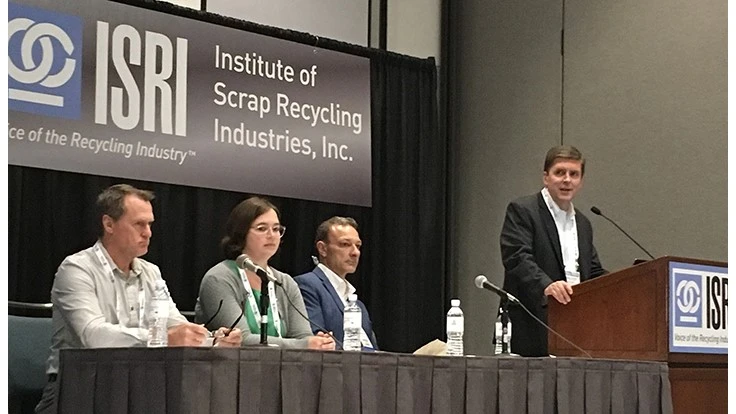
A panel of consumer electronics original equipment manufacturers (OEMs) and recyclers assembled for the ISRI2019 convention acknowledged that several issues are likely to maintain the challenging atmosphere in the electronics recycling sector.
The panel at the recycling convention, which took place in Los Angeles in April, included Doug Smith of global electronics goods maker Sony, Caitlin Sanchez of Irvine, California-based television maker Vizio and Craig Boswell of HOBI International, a recycling firm based in Batavia, Illinois.
While some advocacy groups have pointed to a feared “avalanche” of obsolete electronics, panelists noted that the average weight and size of devices is diminishing rapidly. Sanchez remarked that while console cathode ray tube (CRT) televisions weighed as much as 200 pounds, the flat panel TVs that replaced them checked in at about 40 pounds and subsequent models weigh half of that. “The materials being used shrink and shrink over time,” she commented.
Although plastic has been a growing material of choice in TV and smartphone frames, Sanchez said that some bezel-less display models now contain “almost no plastic” compared to earlier models.
Boswell said for recyclers the diminishing metals content and overall lightweighting trend means now “there is some cost to get [recyclable] materials out [versus profiting from] material value at the back end.”
He added that preparing some devices for reuse can be profitable, but the challenge is the “needle in the haystack problem” of trying to identify the 5 percent or 10 percent of the stream that can be remarketed.
On the topic of designing for recycling (DFR), Smith said, “The design of a product involves a rigorous 50 to 100 types of specifications and sourcing; one of them is DFR.” Smith pointed to the European Union Restriction of Hazardous Substances (RoHS) directive as one of many additional priorities.
Sanchez said that some aspects of device design and manufacturing are trade secrets and proprietary, but that Vizeo takes safety and DFR into account.
Panelists said critical reasons why electronics goods manufacturers continue to use many different types of plastic resins remain, with Smith pointing to the need to meet Underwriters Laboratory (UL) requirements.
Session moderator Walter Acorn of the Arlington, Virginia-based Consumer Technology Association said anti-trust issues present another barrier, although he pointed to the automotive industry as having had some success in creating a plastics supply chain that is “more integrated and manageable.”
ISRI2019, the annual convention of the Washington-based Institute of Scrap Recycling Industries (ISRI), was April 9-12 at the Los Angeles Convention Center in Los Angeles.
Latest from Recycling Today
- Aqua Metals secures $1.5M loan, reports operational strides
- AF&PA urges veto of NY bill
- Aluminum Association includes recycling among 2025 policy priorities
- AISI applauds waterways spending bill
- Lux Research questions hydrogen’s transportation role
- Sonoco selling thermoformed, flexible packaging business to Toppan for $1.8B
- ReMA offers Superfund informational reports
- Hyster-Yale commits to US production





